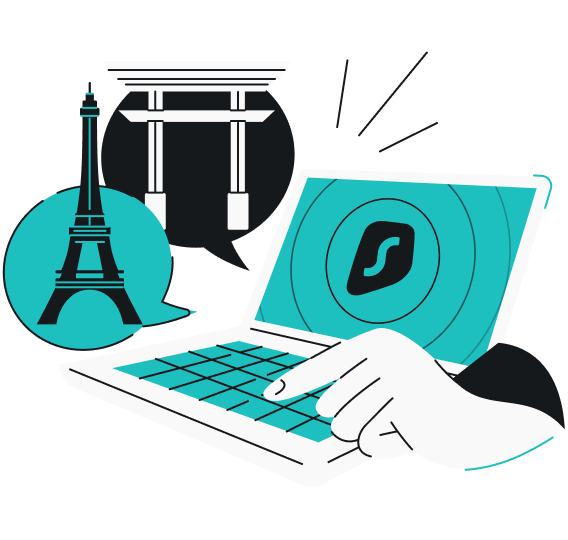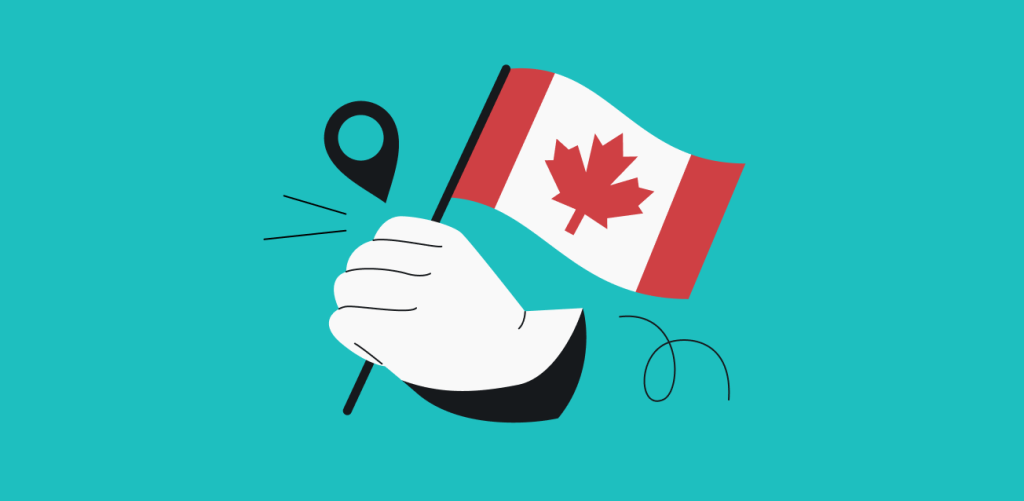A French IP (Internet Protocol) address can help you stay private online, enjoy a secure internet connection, and access more content while overseas.
Wondering how to get a French IP address? A VPN (Virtual Private Network) is the safest and most reliable way, but a proxy server and Tor are other options to check out.
Let’s dive into the three methods to snag a France IP address.
What is a French IP address?
A French IP address is a unique string of numbers assigned to devices connected to French internet servers. It acts like a virtual passport, showing your online location as France to websites and services — even when you’re physically located elsewhere.
When you have a French IP address, websites treat your connection as if you’re browsing from within France — even if you’re on the other side of the world.
Why use a French IP address?
A French IP address can make your online experience smoother and more secure by helping you:
- Enhance privacy protection:
- Hide your real IP address from ISPs, trackers, and third parties;
- Keep your actual location private while browsing.
- Access French home content abroad:
- Reach your home websites and services while traveling;
- Access local news, banking, and government services from anywhere.
- Secure online banking:
- Avoid fraud alerts when accessing French bank accounts abroad;
- Maintain seamless access to financial services.
- Better pricing and deals:
- Access local French pricing on flights, hotels, and online purchases;
- Avoid price discrimination based on your location.
- Bypass censorship:
- Access unrestricted internet in countries with heavy censorship;
- Stay connected to global news and social media.
- Remote work access:
- Connect to French company networks and resources securely;
- Access business tools and platforms provided by the employer.
Disclaimer: Please note that using Surfshark services for any illegal activities is strictly forbidden and violates our Terms of Service. Make sure that any use of Surfshark services for your online activities conforms to all relevant laws and regulations, including those of any service providers and websites you access using Surfshark.
How to get a French IP address
To get a French IP address, you can use a VPN, a proxy server, or Tor. Each method routes your traffic through a French server, giving you its French IP address, but they all work differently. Let’s see how:
Method 1: VPN (recommended)
Best for: complete security, streaming, and everyday browsing
A VPN is the safest and most effective way to get a French IP address. It encrypts your entire internet connection while routing traffic through French servers, giving you both security and access.
How to Get a French IP with Surfshark VPN:
- Subscribe.
- Download and install the VPN app on your devices.
- Open the VPN app and log into your account.
- Search for “France” in the server list.
- Select from servers in Paris, Bordeaux, or Marseille.
Simple setup aside, here’s why Surfshark is one of the best ways to get a France IP address:
- Vast server network: Surfshark has [servers]+ servers in 100 countries, including 76 servers in France. You have ample options whether you wish to swap your French IP address for one from another country or another French city. Plus, with all servers running at 10Gbps, you can enjoy a fast, reliable connection with minimal risk of overcrowding and slower speeds.
- Modern protocols: all Surfshark servers, whether in or outside France, support lightweight modern VPN protocols — WireGuard, IKEv2, and OpenVPN. They’re also 100% RAM-only, meaning they don’t store your online activity and are wiped clean upon each shutdown or reboot for maximum privacy.
- Advanced security features: static servers let you use the same French IP address every time you connect, while our Rotating IP assigns fresh IP addresses without changing your VPN location. Meanwhile, the kill switch automatically disables internet access if your VPN connection ever drops, and Multi Hop lets you connect via two different VPN servers simultaneously.
Method 2: Proxy server
Best for: quick IP masking without encryption needs
A proxy server acts as an intermediary between your device and websites, routing your traffic through a French server to mask your IP address.
How proxy servers work:
- Select a French proxy — choose a proxy server located in France.
- Configure the connection — set up proxy settings in your browser or device.
- Browse with a French IP — your traffic appears to come from France.
Proxy limitations:
- No encryption — your data remains vulnerable to interception;
- Limited security — only masks IP address, doesn’t protect privacy;
- Blocking issues — many sites can detect and block proxy traffic;
- Free proxy risks — may log and sell your data to third parties.
Method 3: Tor Browser
Best for: maximum anonymity if slower speeds aren’t a problem
The Tor (The Onion Router) Browser routes your traffic through multiple encrypted relays, providing strong anonymity while allowing you to select a French exit node.
How to use Tor to get a French IP:
- Download the Tor Browser — install the free Tor Browser.
- Configure the exit node — set France as your preferred exit location.
- Browse anonymously — your traffic routes through multiple encrypted relays.
Tor considerations:
- Slower speeds — multiple encryption layers reduce performance;
- Complex setup — requires technical configuration for specific countries;
- Volunteer network — relies on community-operated servers;
- Dark web exposure — access to potentially risky content.
Note: Many users pair Tor with a VPN for enhanced security.
Troubleshooting common issues with a French IP
Slow connection speeds
- Try different French server locations;
- Switch VPN protocols (WireGuard recommended);
- Check for background applications consuming bandwidth.
Blocked access
- Clear browser cookies and cache;
- Try different French servers;
- Contact support for server-specific issues.
VPN service detection
- Use dedicated IP for sensitive services;
- Enable obfuscation features if available;
- Rotate between different French servers.
Getting a dedicated French IP address
Need to access French services that are sensitive to IP changes? Then a dedicated IP address might be just what you need.
A dedicated IP address is a static IP that’s unique to you. No one else can use it, and you’ll get the same IP address every time you connect to your designated French VPN server.
If you’re looking for your own IP in France, Surfshark offers a dedicated IP add-on. Its main features include:
- Consistent access: same IP address every time you connect;
- Fewer CAPTCHAs: reduces security challenges from changing IPs;
- Multiple devices: share the same French IP across all devices;
- Banking compatibility: ideal for sensitive financial services that can’t be accessed from abroad.
The bottom line: change your online location to France with a VPN
Whether you’re looking to protect your privacy, enable remote work, or overcome oppressive censorship, a French IP address can be valuable when you’re far from home.
Yes, you can get a French IP address using a proxy server or the Tor Browser, but a VPN is the best way for most internet users to secure a French IP address. It not only masks your IP with a French IP address but also encrypts your internet traffic to keep your online activities private and your personal information safe.
FAQ
Is it legal to use a VPN to get a French IP address?
Yes, it’s legal to use a VPN to get a French IP address in most regions, including Europe, North America, and Asia. However, it’s still illegal to participate in any criminal activities online while using a VPN.
Is there a free way to get a French IP address?
Free VPNs and proxies exist but often compromise speed, security, and privacy. They may have data limits, slower speeds, and potential privacy risks. Paid services like Surfshark provide safer, more reliable connections.
How do I verify my IP is from France?
You can use Surfshark’s IP address checker to check if you have a French IP address. It shows your current IP address, ISP, and approximate location.
Can I get a French IP address from a specific city in France?
Yes, you can get a French IP address from a specific city in France. Surfshark has 76 servers in France, located in Paris, Bordeaux, and Marseille. Simply select and connect to a server in your preferred location to get a city-specific French IP address.
Will a French IP address slow down my internet?
Modern VPN services like Surfshark typically cause minimal speed reduction (around 10-15%). Choose servers geographically closer to your location and use efficient protocols like WireGuard for optimal performance.
Can I use a French IP for online banking?
Yes, a French IP address can help avoid fraud alerts when accessing French bank accounts from abroad. Banks often flag foreign IP addresses as suspicious, so a French IP provides seamless access.
Do streaming services work with French IP addresses?
Yes, French IP addresses allow access to French streaming platforms and local content libraries. VPNs generally provide better streaming performance than proxies or Tor.
How often should I change my French server?
For general browsing, you can stay connected to the same server. Change servers if you experience slow speeds, connection issues, or need to access content from different French regions.
How can I get a French IP address on my phone?
To get a France IP address on your phone, sign up for a Surfshark account. Download and install the Surfshark app from either the Google Play Store or the App Store. Launch the VPN app, log in, and connect to a server in France. Your phone now has a French IP address.



